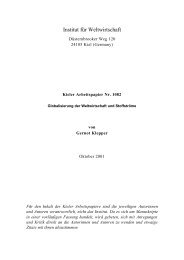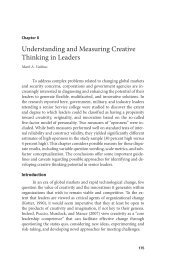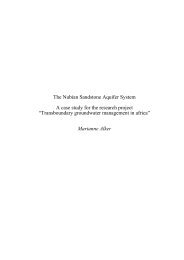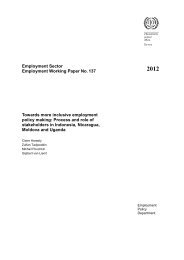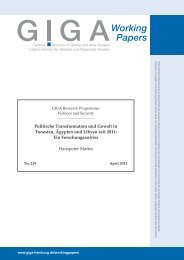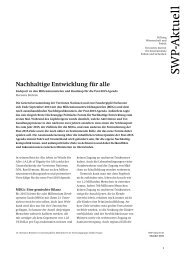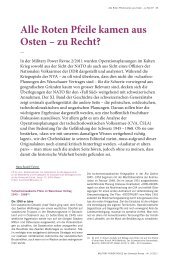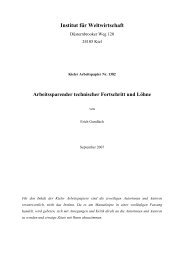Authoritarian Rule and Democracy in Africa: A Theoretical Discourse
Authoritarian Rule and Democracy in Africa: A Theoretical Discourse
Authoritarian Rule and Democracy in Africa: A Theoretical Discourse
You also want an ePaper? Increase the reach of your titles
YUMPU automatically turns print PDFs into web optimized ePapers that Google loves.
to oil its patronage mach<strong>in</strong>e <strong>and</strong> govern without much coercion. Botswana on the other h<strong>and</strong>has one of the fastest grow<strong>in</strong>g economies <strong>in</strong> <strong>Africa</strong>. Its growth rests, however, on potentiallyshaky m<strong>in</strong>eral revenues, whose collapse may stra<strong>in</strong> the patronage system that underp<strong>in</strong>s itsfledgl<strong>in</strong>g democracy.Model C represents an economy <strong>in</strong> rapid transition to capitalism, where rent-seek<strong>in</strong>gactivities play crucial roles <strong>in</strong> support<strong>in</strong>g private capital. Most <strong>Africa</strong>n economies werelaunched on this path of development at <strong>in</strong>dependence. <strong>Authoritarian</strong> rule accompanied suchexpansion. We analyze the details of this development <strong>and</strong> that of model D <strong>in</strong> the next sectiondeal<strong>in</strong>g with “stages <strong>in</strong> the struggles for democracy”. Here it is significant to po<strong>in</strong>t out thatvarious authoritarian ideologies – negritude, authenticity, <strong>Africa</strong>n socialism – <strong>and</strong> politicalrégimes such as military <strong>and</strong> one-party dictatorships were devised to push the frontiers ofaccumulation <strong>and</strong> ma<strong>in</strong>ta<strong>in</strong> a firm grip on the political process.Model D represents an economy <strong>in</strong> crisis. There is de-<strong>in</strong>dustrialization, excessive pilfer<strong>in</strong>g ofpublic resources <strong>and</strong> dependence on the petty commodity sector for social reproduction. Thefiscal crisis <strong>and</strong> adjustment measures <strong>in</strong>troduced to cope with the recession lead to furtherrepression as disaffected groups try to resist them. The social contract comes underconsiderable stress. Pressures for democratization <strong>in</strong>tensify. This may even lead to theestablishment of democratic governments as <strong>in</strong> many Lat<strong>in</strong> American countries that are <strong>in</strong>transition from authoritarian to democratic rule. But stable <strong>and</strong> susta<strong>in</strong>able democracy cannotbe guaranteed without substantial changes <strong>in</strong> the forms of accumulation <strong>and</strong> socio-economicdevelopment.Model E represents an economy <strong>in</strong> deep crisis. De-<strong>in</strong>dustrialization is buttressed by thefailure of the petty commodity sector to absorb the displaced groups <strong>in</strong> the modern sector.Rural-urban relations are marked by extreme dualism. Competition for state power <strong>in</strong>tensifies.<strong>Authoritarian</strong>ism is rife. Individualist solutions flourish, further weaken<strong>in</strong>g the collectivestruggles for democracy. State terror <strong>in</strong>tensifies with the collapse of the social contract <strong>and</strong> thefailure of patron-client relations to check the <strong>in</strong>stability generated by the depression.Model F represents the collapse of the modern economy <strong>and</strong> a return to petty commodityproduction. Economic activity is marked by subsistence production, low levels of exchange<strong>and</strong> barter. Fragmented k<strong>in</strong>ship ties tend to regulate social relations. Collective family <strong>and</strong>k<strong>in</strong>ship support systems take the place of public welfare. Civil society disappears as thepublic <strong>and</strong> private roles of <strong>in</strong>dividuals <strong>and</strong> enterprises become fused. This can lead tomixtures of authoritarian <strong>and</strong> <strong>in</strong>formal, village level democracy. Recent scenarios of thewither<strong>in</strong>g away of the <strong>Africa</strong>n state <strong>and</strong> general theories of state decay, <strong>in</strong> a way, fit thismodel of accumulation (Chazan, 1983; S<strong>and</strong>brook, 1985). This perspective does not ignorethe progressive role that has been played by the petty commodity sector <strong>in</strong> most <strong>Africa</strong>nsocieties <strong>in</strong> build<strong>in</strong>g modern states <strong>and</strong> support<strong>in</strong>g the activities of large-scale capital. It isalso the case that <strong>in</strong> the current crisis, <strong>in</strong>formal sector <strong>and</strong> peasant activities provide useful fallback positions for many <strong>in</strong>dividuals <strong>and</strong> households that have been displaced by modernenterprises <strong>and</strong> the state. Some sectors also show some promise <strong>in</strong> provid<strong>in</strong>g a basis forsusta<strong>in</strong>ed economic development. Petty commodity production cannot, however, be viable <strong>in</strong>the absence of a properly function<strong>in</strong>g modern sector.Most <strong>Africa</strong>n countries are currently operat<strong>in</strong>g either model D or E. IMF <strong>and</strong> World Bankprogrammes seek to check the expansion of the state, which they believe is responsible forrent-seek<strong>in</strong>g activities <strong>and</strong> the economic crisis, <strong>and</strong> move the economies to model B <strong>and</strong>eventually to A. But there is the danger that the adjustment programmes will lead tostagnation at D or a movement to E. The scenario of decay<strong>in</strong>g states (F) should also not beruled out. Popular forces may be <strong>in</strong>terested <strong>in</strong> a strategy that pushes the economies to model Bor A <strong>in</strong> order to strengthen their barga<strong>in</strong><strong>in</strong>g positions <strong>in</strong> the new democratic polity. Peasants13






